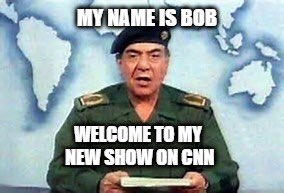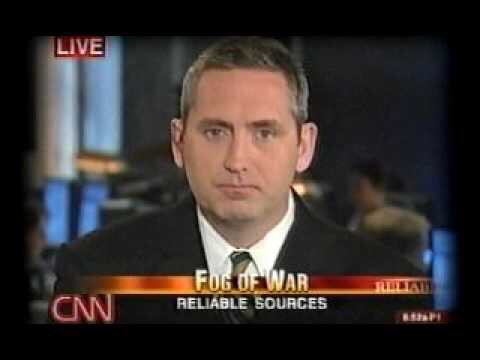. @Acosta Runs Interference for @WHO and the CCP After Trump Cuts Off Funding; Calls Trump ‘Baghdad Bob’
Thanks, Jim for the perfect segue for us all to remember @CNN’s 12-years of reporting in Baghdad, Iraq, where CNN “propaganda flowed like wine.” https://townhall.com/tipsheet/juliorosas/2020/04/14/jim-acosta-runs-interference-for-the-who-and-the-chinese-communist-party-after-tr-n2566933">https://townhall.com/tipsheet/...
Thanks, Jim for the perfect segue for us all to remember @CNN’s 12-years of reporting in Baghdad, Iraq, where CNN “propaganda flowed like wine.” https://townhall.com/tipsheet/juliorosas/2020/04/14/jim-acosta-runs-interference-for-the-who-and-the-chinese-communist-party-after-tr-n2566933">https://townhall.com/tipsheet/...
CRAVEN NEWS NETWORK
By Eric Fettmann April 12, 2003
https://nypost.com/2003/04/12/craven-news-network/">https://nypost.com/2003/04/1...
By Eric Fettmann April 12, 2003
https://nypost.com/2003/04/12/craven-news-network/">https://nypost.com/2003/04/1...
CNN chief news executive Eason Jordan yesterday revealed that his network had refused for years to report what it knew about Saddam Hussein’s murderous atrocities – even against its own journalists.
This astonishing confession doesn’t just undermine CNN’s claim to be “the most trusted name in news” – it wreaks incalculable damage on all journalists’ ability to be trusted by the American people.
In a New York Times op-ed piece, Jordan disclosed that over the past dozen years CNN kept a tight lid on “awful things that could not be reported, because doing so would have jeopardized the lives of Iraqis, particularly those on our Baghdad staff.”
In return for its silence, CNN was allowed to maintain a permanent Baghdad bureau – long the only one by a U.S. network in the Iraqi capital.
But to what point – if the only way to keep the bureau working was to soft-pedal Saddam’s horrors?
But to what point – if the only way to keep the bureau working was to soft-pedal Saddam’s horrors?
If you can’t report the truth, why have journalists there in the first place?
It’s like saying that the best interests of journalism would have justified suppressing stories on the Holocaust in WW II in order to keep a U.S. news bureau in Berlin so as to be able to tell Nazi Germany’s side of the story.
Until yesterday, CNN long insisted that its arrangement with Saddam Hussein and his henchmen did not impair its ability to report freely.
“CNN has demonstrated again and again that it has a spine,” Jordan told NPR’s Bob Garfield last October.
“CNN has demonstrated again and again that it has a spine,” Jordan told NPR’s Bob Garfield last October.
“It’s prepared to be forthright, is forthright in its reporting. We wouldn’t have a team in northern Iraq right now if we didn’t want to upset the Saddam Hussein regime.”
Perhaps.
Perhaps.
But even Peter Arnett, who became a star reporting from Baghdad during the first Gulf War, conceded to The New Republic’s Franklin Foer last fall that “there’s a quid pro quo for being there [in Baghdad]. You go in and they control what you do. . . .
So you have no option other than to report the opinion of the government of Iraq.”
Foer’s devastating piece detailed how Western reporters – CNN’s Baghdad bureau chief, Jane Arraf, chief among them – would “mimic the Ba’ath Party line” in a “go along to get along” strategy.
Foer’s devastating piece detailed how Western reporters – CNN’s Baghdad bureau chief, Jane Arraf, chief among them – would “mimic the Ba’ath Party line” in a “go along to get along” strategy.
And, in fact, CNN worked long and hard over the years to convince Saddam’s regime that it could trust the cable network.
In a remarkable on-air exchange in 1996, after Deputy Foreign Minister Tariq Aziz said Arnett would only be allowed back into Baghdad “if you promise that you will give candid, objective, fair coverage,”
CNN anchor Bernard Shaw replied: “We have no axes to grind, we don’t support any particular government,” then pleaded with Aziz to let CNN “enter your country so that we can report both sides of the story.”
But as we now know, that’s not what CNN had in mind.
But as we now know, that’s not what CNN had in mind.
Among the stories suppressed by CNN, according to Jordan:
* A CNN Iraqi cameraman was kidnapped by Saddam’s secret police, then beaten and subjected to electroshock torture for weeks.
* A CNN Iraqi cameraman was kidnapped by Saddam’s secret police, then beaten and subjected to electroshock torture for weeks.
* Other Iraqis working for Western press organizations similarly disappeared – some for good.
* A Kuwaiti woman who had spoken with CNN was beaten daily for months in front of her father, then had her body torn limb from limb, the parts left in a bag on her family’s doorstep.
* A Kuwaiti woman who had spoken with CNN was beaten daily for months in front of her father, then had her body torn limb from limb, the parts left in a bag on her family’s doorstep.
* Uday Hussein boasted directly to Jordan that he would assassinate his two brothers-in-law, who had defected. Months later, both men were lured back and killed.
Indeed, CNN’s silence seems to have cost as many lives as it may have saved.
Indeed, CNN’s silence seems to have cost as many lives as it may have saved.
What did it show instead? Foer notes such stories as a series of public “demonstrations” for Sadam’s 65th birthday.
“Everyone knows they’re a sham,” one Western journalist told Foer, “but CNN in Atlanta is telling [correspondent] Nic Robertson that he has to file a story, so he shows the demonstration.”
Selling such propaganda as news is problematic enough. Keeping quiet about the real news – torture, initimidation and murder – makes a mockery of journalists’ professed responsibility to be a truth-teller.
That’s the problem with Faustian bargains – like the one Eason Jordan and CNN made with Saddam Hussein to keep CNN reporting from Baghdad. Ultimately, it means the devil takes possession of your soul for eternity.
So deeply had Mr. Jordan morally compromised himself and CNN that Uday the psychopath felt comfortable confiding his highest-visibility murder plans to Mr. Jordan. His secrets were safe with CNN. What a scoop they missed: "Son of Saddam Hussein plans to murder King of Jordan."
The entire Arab world might have turned on Saddam years ago if that story had been reported. But, if CNN had reported it, it would not have been able to keep open its Baghdad bureau and would have lost the profitable competitive advantage it maintained over rival news outlets.
For the last twelve years, CNN has provided the West with the dominant news image of Saddam& #39;s Iraq. It was the jewel in the crown of CNN& #39;s international reporting reputation.
But, now we know, from the unwitting pen of CNN& #39;s morally obtuse chief news executive, that it was always a false image CNN was broadcasting. The hard news was kept secret. The propaganda flowed like wine.
CNN was running a straight propaganda-for-profits deal with Saddam. Until CNN brings in honest news executives, no prudent viewer should trust CNN& #39;s current and future reporting from other foreign capitals.
Margaret Wente writes in Canada’s Globe and Mail (“Saddam’s silent collaborators” – April 15, 2003) of the children’s prison in Baghdad where the regime locked up the kids of parents deemed disloyal to the regime, and tortured them.
She questions why for years CNN and others didn’t report on “the children’s screams” even though they were known about. Former weapons inspector Scott Ritter, for example, said he knew about the children’s prison because his team inspected it in 1998.
He once said it was the most horrific thing he had seen.
“Probably 200 kids from toddlers to 12-year-olds. The stench was unreal –urine, feces, vomit, sweat. The kids were howling and dying of thirst. We threw water in there, but the Iraqis probably took the water out after.”
“Probably 200 kids from toddlers to 12-year-olds. The stench was unreal –urine, feces, vomit, sweat. The kids were howling and dying of thirst. We threw water in there, but the Iraqis probably took the water out after.”
But there were alternatives. CNN could have abandoned Baghdad. Not only would they have stopped recycling lies, they could have focused more intently on obtaining the truth about Saddam.
They could have diverted resources to Kurdistan and Jordan (the country), where recently arrived Iraqis could speak without fear of death. They could have exploited exile groups with underground contacts.
There& #39;s another reason why Mr. Jordan doesn& #39;t deserve applause. He says nothing about the lessons of Baghdad. After all, the network still sends correspondents to such countries as Cuba, Burma and Syria, ruled by dictators who impose media "guidelines."
Even if CNN ignores the moral costs of working with such regimes, it should at least pay attention to the practical costs. These governments only cooperate with CNN because it suits their short-term interests. They don& #39;t reward loyalty.

 Read on Twitter
Read on Twitter



